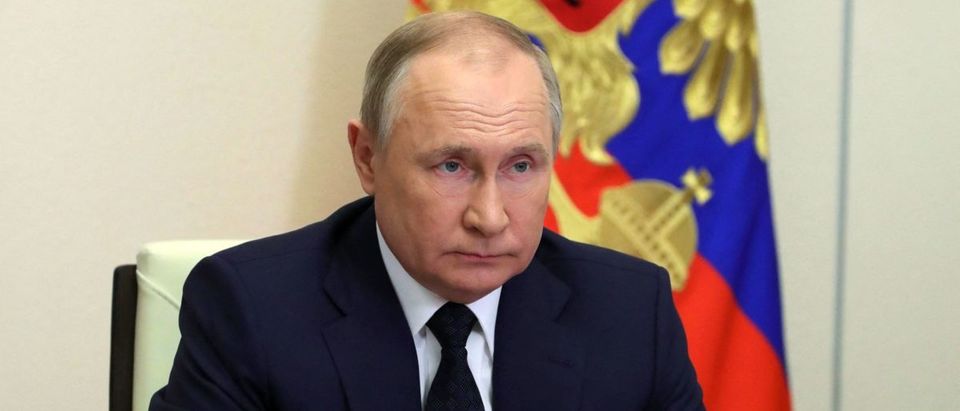Editor’s note: We endeavor to bring you the top voices on current events representing a range of perspectives. Below is a column arguing that Russians should take it upon themselves to oust Vladimir Putin from power. You can find a counterpoint here, where the Center for the National Interest’s Dr. Sumantra Maitra argues that regime change in Russia is a dangerous idea.
At the end of an emotional March 26 speech in Warsaw, President Joe Biden exclaimed about Russian leader Vladimir Putin, “For God’s sake, this man cannot remain in power!” Those closing words, apparently ad-libbed, caused a worldwide uproar. After all, when confronting a war-prone nuclear power, one must be careful talking about regime change. Biden had barely left the podium before administration officials started walking back his expostulation, and soon, so did an obviously chastened 46th president.
Biden’s outburst violated a cardinal principle of statecraft: If your opponent is armed and dangerous, it’s best to give him a plausible way to back down — an “exit ramp.” As the Chinese military philosopher Sun Tzu wrote 2,500 years ago, “When you surround an army, leave an outlet free. Do not press a desperate foe too hard.” With that wisdom in mind, our goal should be to de-escalate the conflict in Ukraine. Yes, most Americans want the Ukrainians to win, but we don’t want Putin, in a fit of desperation, to fire off nukes.
Still, the idea of getting rid of the Russian warmonger is in the air. Notably, on March 3, Republican South Carolina Sen. Lindsey Graham made headlines when he tweeted, “Is there a Brutus in Russia? Is there a more successful Colonel Stauffenberg in the Russian military? The only way this ends is for somebody in Russia to take this guy out. You would be doing your country – and the world – a great service.”
There’s a lot to unpack there. In the first century BCE, Brutus was one of the assassins of Julius Caesar, who was hated by liberty lovers for having overthrown the Roman Republic. To many American patriots of the Revolutionary Era, Brutus was a hero. Claus von Stauffenberg was the German army officer who set off a powerful bomb that should have killed Adolf Hitler in 1944 (his story was told, with considerable accuracy, in the 2008 Tom Cruise movie “Valkyrie“). Graham’s words were widely condemned, in no small part because he has been so associated with an earlier, misbegotten regime change, namely, the 2003 U.S. invasion of Iraq. That war succeeded in removing Saddam Hussein, but it was no cakewalk; in fact, strategically, the invasion was a costly failure. So Graham is hardly the ideal champion of regime change.
Still, on “Saturday Night Live” a few days later, Colin Jost quipped that it was “a shocking disgusting example of Lindsey Graham being kinda right about something.” In a more serious vein, distinguished Russia scholar Robert Service told The Wall Street Journal, “Putin’s got to be removed from power,” arguing that his departure was the only sure way to release embattled Ukraine from its torment.
So yes, it would be good if Putin were gone. But who best to do the deed? That is a question. We might learn from one of Stauffenberg’s fellow anti-Hitler conspirators, Henning von Tresckow. After Stauffenberg’s assassination attempt failed, and the Nazis set out for revenge, Tresckow told a comrade, “I am still totally convinced that we did the right thing. Hitler is the archenemy not only of Germany but of the world.” Knowing that he himself was planning to commit suicide rather than be arrested by the Gestapo, Tresckow continued, “When, in few hours’ time, I go before God to account for what I have done and left undone, I know I will be able to justify what I did in the struggle against Hitler. God promised Abraham that He would not destroy Sodom if only ten righteous men could be found in the city, and so I hope for our sake God will not destroy Germany.”
With that honorable witness in mind, we can say: Putin is not Hitler, and yet Russia’s place in the roster of civilized nations depends on his being removed. And for the sake of the eventual restoration of Russia’s national honor, who better to put the kibosh on Putin than a Russian?
In fact, Russian history is replete with coups and murders — not all of them honorable. In 1762, Tsar Peter III was removed from power and died shortly thereafter. In 1801, Tsar Paul I was murdered in his own palace bedroom. In 1881, Tsar Alexander II was killed by an assassin’s bomb. And in 1918 Tsar Nicholas II was shot by the Bolsheviks.
Yet for a Russian leader, the abrupt end of a career isn’t always violent: In 1964, Soviet chief Nikita Khrushchev was peacefully removed from power; he spent his last years as a pensioner, secretly working on a memoir.
Getting rid of a Russian leader: If it’s happened before, it can happen again. And that is an encouraging thought.
James P. Pinkerton, a former White House domestic policy aide to Presidents Ronald Reagan and George H. W. Bush, has been a Fox News contributor since 1996.


